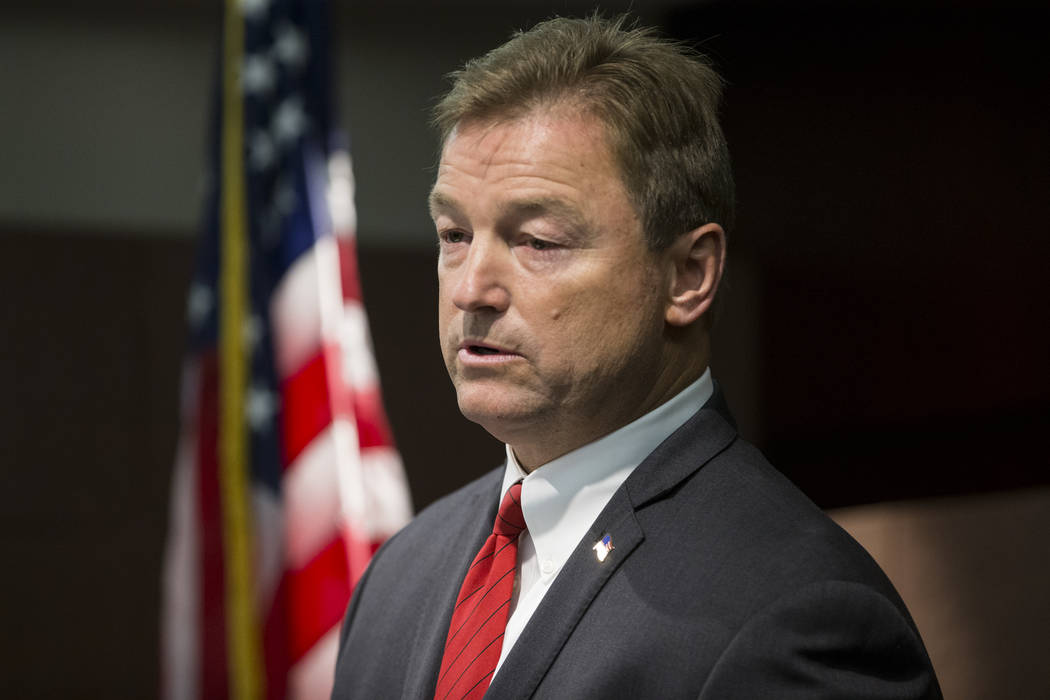
U.S. Sen. Dean Heller, R-Nevada. is pushing fiercely for Congress to move on tax reform, though it could happen sooner rather than later.
Heller, along with several of his colleagues in the U.S. Senate, including Sen. David Perdue, R-Georgia, are pushing a “24/7 narrative” to keep Congress active on tax reform, along with other initiatives.
With the push, Heller hopes to bring these initiatives across the finish line, he said in a conference call with several rural newspapers in Nevada on Wednesday.
Heller said the “goal is to have tax reform out of the United States Senate before Thanksgiving.”
The stage may be set for tax reform to move quickly.
The U.S. House of Representatives moved on Thursday to make tax reform easier to pass through the Senate.
The House passed, though narrowly, a $4 trillion budget resolution.
The 216-212 vote also sweeps in new reconciliation rules, inside the budget, that would allow the Senate to pass tax reform with a simple majority. This would allow Republicans to overcome a potential filibuster, which requires 60 votes to break.
The Senate already approved the $4 trillion budget on Oct. 20. The reconciliation rules now head to Trump’s desk for his signature. The president doesn’t need to sign the budget.
If tax reform is passed, some projections show it could cut taxes by as much as $1.5 trillion over the next 10 years.
On the Wednesday call with Heller, the senator said he’d been working with Ivanka Trump and other colleagues for most of the day to work on increasing the child tax credit in the plan.
“There’s an effort by a number of us here in the Senate to try to double that child tax credit for working families,” Heller said.
The current credit is worth up to $1,000 per qualifying child, depending on income, according to the Internal Revenue Services’ website.
In Heller’s discussions with Ivanka and his colleagues, he said he made it “clear that a bigger child tax credit could assist tens of thousands of families in Nevada by helping parents buy diapers, groceries, or school supplies for their kids,” he said in an email to the Pahrump Valley Times.
Heller sees other benefits as well with the potential for lowering tax rates for small businesses that “will help industries all across the spectrum, including tourism, construction and hospitality, create more jobs and give their workers higher wages.”
Though the framework has yet to be finalized, tax reform could reduce corporate tax from its current rate of 35 percent to 20 percent. The top rate on “pass-through” business income, wages and interest, would drop to 35 percent, according to a report by Forbes in early October.
Standard deductions allowed for individuals and married couples would increase, though personal exemptions and many itemized deductions would be eliminated, Forbes reported.
Stephen Miller, director of University of Nevada, Las Vegas’ Center for Business and Economic Research, explained that “Any tax reform that lowers tax rates should be coupled with elimination of deductions, which may not occur.”
“That is, we get tax rate reductions, but the deductions remain,” Miller continued.
If this scenario were to occur in tax reform, Miller said “we clearly will increase our deficits going forward at the national level and increase our debt burden more quickly. It is far from clear that we need fiscal stimulus with the unemployment rate at 4.2 percent.”
On a state level, people with higher incomes “who do not take the standard deduction and itemize their actual deductions will possibly lose the sales tax deduction in Nevada,” Miller said.
Heller, who said he’s been in communication with House Speaker Paul Ryan, said the process to getting tax reform on the move could start as early as next week, with the Senate potentially starting their move a week to 10 days after that.
Contact reporter Jeffrey Meehan at jmeehan@pvtimes.com. On Twitter: @pvtimes